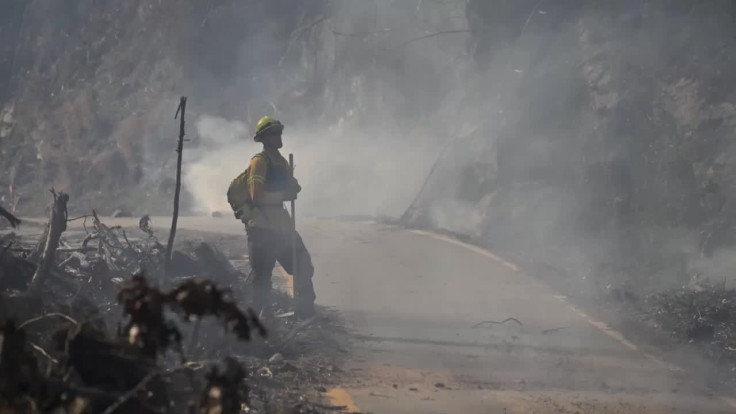
The summer of 2025 has brought some of the worst air quality ever recorded to large parts of the United States. Cities across the Midwest and Northeast—especially Chicago, Detroit, Cleveland, New York City, Boston, and Philadelphia—are under siege from thick smoke drifting south from Canadian wildfires, according to an August report from NPR.
The Environmental Protection Agency has issued Code Red and even Purple Air Quality Alerts for these urban centers. On the worst days, levels of dangerous particulate matter (PM2.5) have soared far above safe limits, forcing state and local governments to close parks, cancel outdoor events, and urge residents to stay inside. Vulnerable groups—children, the elderly, and those with respiratory illnesses—face the highest risks.
Active weather map highlights air quality concerns in the upper Midwest and Northeast, extreme heat and wildfire risks in the 4-Corners region and central Great Basin, with Red Flag Warnings in Hawaii. Heavy rain and flash flood potential in the Southeast. Visit… pic.twitter.com/4YTWL1QSE7
— National Weather Service (@NWS) August 3, 2025
. Illinois, Michigan, Ohio, Pennsylvania, New York, and Massachusetts have distributed N95 masks in affected neighborhoods and modified school and camp schedules during high-pollution days. Funding for public health messaging has surged, warning millions about the real dangers of repeated exposure to wildfire smoke. "This is no longer a once-in-a-decade event; it's becoming annual," Dr. Lisa Patel of Stanford told NPR, echoing growing concern among health experts.
But the crisis isn't just about public health. It's fueling new political debates and policy changes. The Biden administration has called attention to the need for cross-border cooperation with Canada, with an EPA spokesperson stating, "We are working closely with our partners across North America to address this unprecedented challenge." At the same time, pressure is mounting on Congress to boost funding for wildfire prevention and strengthen emissions standards.
Climate change adaptation is at the heart of these discussions. Proposals on the table include more investment in forest management, expanded early warning systems, and stricter pollution controls. Yet partisan divides remain, especially in Washington, over how aggressively to tackle the climate factors driving these disasters.
Recent Pew Research Center polling shows these smoky skies are shifting public opinion fast. Sixty-eight percent of Americans in affected states say they are "very concerned" about worsening air quality from wildfires. That concern jumps above 75% for adults under 40—a generation that's grown up hearing about climate risk, now experiencing it firsthand. Support for stronger government wildfire prevention has climbed nearly 10 points in just one year, particularly among suburban voters in Midwest and Northeast swing states.
For engaged citizens, the stakes are rising. This summer's smoke has exposed weaknesses in emergency planning and federal-state coordination. Frustration is mounting, with advocacy groups demanding faster, more robust action to safeguard air quality. With the November elections approaching, candidates in major cities and battleground states like Michigan and Pennsylvania are already being pressed to explain their plans for environmental protection and public health preparedness.
Looking forward, the political implications are significant. Lawmakers are pushing for bipartisan bills to boost cross-border fire management with Canada and direct new funds toward urban resilience against airborne pollution. If these smoke events become annual, air quality could become as central to public health—and political debate—as water safety. Expect voters to demand more from their leaders each summer the skies turn gray.
© 2025 Latin Times. All rights reserved. Do not reproduce without permission.




